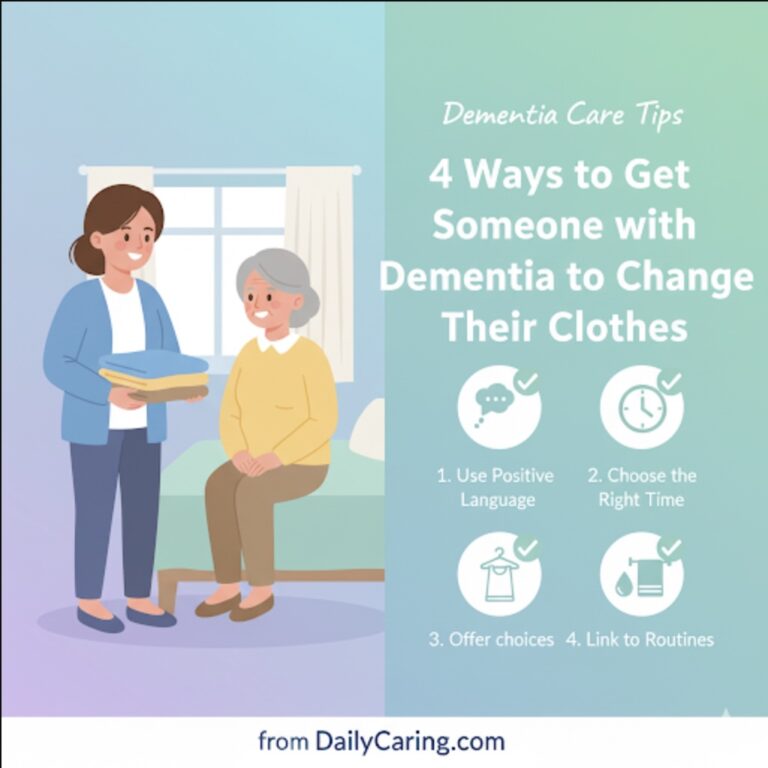For people living with Alzheimer’s, the fear of being alone, even for just a few moments, can trigger overwhelming anxiety, agitation, or panic. This deep-seated need for constant reassurance often stems from confusion, memory loss, and a shrinking sense of security in their surroundings.
As a caregiver, managing this fear while maintaining your well-being can feel exhausting. These five compassionate strategies help ease your loved one’s distress without requiring you to be by their side 24/7 because you deserve moments of respite, too!

Alzheimer’s and the Fear of Being Alone
Many caregivers find it challenging to cope when their loved one has Alzheimer’s and a fear of being alone.
When a person with Alzheimer’s disease or dementia doesn’t want you out of their sight, this behavior is called shadowing.
Their fear can cause them to follow you around the house, so you’re constantly in their sight. They might even get upset if you go to the bathroom or take the trash outside.
This behavior can also make it difficult for you to leave the house – they might cry, become angry or mean, or repeatedly ask where you are.
We explain why someone with dementia might be afraid to be alone and share 5 techniques that help reduce the fear that causes shadowing and help you cope with the behavior.
Why Someone with Dementia Is Afraid to be Alone
Experts suggest that Alzheimer’s or dementia shadowing happens because the damage in their brain has caused them to make you the center of their world.
They’re not doing it purposely to be difficult or to cause trouble. They follow you closely to reassure themselves that you’re still there.
You’re their lifeline and connection to the outside world. You care for and provide for them and keep them safe from anything strange or confusing.
And when they can’t see or touch you, they can get scared and anxious.
Even if you’ve never done anything to make them think you’d abandon them, they may become paranoid that you’ll leave and never come back.
The fear isn’t caused by anything you’ve done. It’s yet another challenge of living with dementia.
VIDEO: The Fear of Being Alone with Alzheimer's Disease
5 Ways to Reduce Alzheimer’s Shadowing
1. Include other trusted people
One of the best ways to help your older adult feel safe and secure, even when you’re not there, is to expand their world by adding one or two more people.
This needs to be done slowly so your older adult can grow to trust and rely on the “new” people and feel comfortable enough to be alone with them while you get some much-needed time away.
These additional people could be other family members, close friends, or professional caregivers.
Start by having them come regularly to help while you’re with your older adult. Then, slowly ease them into doing more.
Over time, your older adult will be ok with them taking over while you’re not around.
2. Involve them in repetitive, soothing activities if you need to step away
Sometimes you need time to do chores in the house without someone (literally) breathing down your neck.
When this happens, ask your older adult to “help” you and give them a soothing, repetitive task to keep them occupied and distract them from their fear.
For example, if you need to cook dinner, ask them to sit at the kitchen table and sort a pile of forks and spoons, fold hand towels, smooth crumpled tissue paper, or organize the kitchen junk drawer. Any safe activity that doesn’t cause trouble will do.
The goal isn’t for your older adult to accomplish the task correctly; it’s to keep their hands and minds happily occupied.
3. Distract and redirect
Distracting and redirecting are helpful when you need to leave the house, or when your older adult has already become highly agitated because you’ve left their sight.
First, find a way to gently validate what they’re saying.
Even if they say something like, “You hate me, you can’t wait to get away from me, and you’re abandoning me!” you could respond calmly by saying, “Oh my, you must be feeling very upset.”
This type of answer validates their feelings and avoids a bigger fight because you didn’t say they were wrong.
It’s calming even if you didn’t directly agree with what they said because it shows you recognize how they feel.
Next, please find a way to distract them from their worry about you leaving them.
For example, you could point out a pretty flower in the backyard, offer them a favorite drink or snack, or ask them for help with a made-up task and walk together to another part of the house.
Then, redirect them to an activity that they enjoy.
You or someone who’s helping out while you’re out may have to do this over and over again, depending on how much fear and anxiety your older adult is feeling.
4. Make a recording of yourself
Another way to soothe your older adult when you can’t be right next to them is to have them listen to or watch something you’ve recorded for them.
Maybe it’s a tape or digital recording of you reading their favorite book. Or you might make a video of you reading aloud or doing regular chores.
Sometimes, just being able to hear or see you is enough comfort to get them through the time of separation.
5. Help them understand how long you’ll be gone
Part of the issue is that someone with Alzheimer’s or dementia loses their sense of time.
A minute, a day, or a year might seem the same because they’ve lost the ability to keep track of time.
So, saying you’ll just be gone for a minute might not mean anything to them.
To help them track time, try something simple like an egg timer.
For example, if you’re going to the bathroom, set the timer for 5 minutes.
Have your older adult hold the timer and tell them that when the buzzer goes off, you’ll be back. They’ll be able to watch the numbers count down and know exactly when you’ll return.
This can also work for other quick chores like checking the mailbox or taking out the trash.
Final Thoughts
Navigating the deep-seated fear of being alone with an Alzheimer's sufferer is a journey that demands immense compassion, for them and for yourself. Remember, these five strategies are not about achieving perfection, but about offering consistent reassurance and forging moments of connection that can pierce through the anxiety.
Be patient with your efforts; even a brief moment of calm is a significant victory. By weaving these approaches into your daily routine, you are providing a powerful, unspoken message: “You are not alone, and you are loved.” That foundation of security is the most profound comfort you can offer.
Recommended for you:
- 3 Ways to Respond When Someone with Alzheimer’s Says I Want to Go Home
- Therapeutic Fibbing: Why Experts Recommend Lying to Someone with Dementia
- 4 Ways to Respond When Someone with Alzheimer’s Is Repeating the Same Thing Over and Over
About the Author

Connie is the founder of DailyCaring.com and was a hands-on caregiver for her grandmother for 20 years. (Grandma made it to 101 years old!) She knows how challenging, overwhelming, and all-consuming caring for an older adult can be. She also understands the importance of support, especially in the form of practical solutions, valuable resources, and self-care tips.














I am carer for my 90 yr old mum. I have only just found your link and has been most informative and helpful. However Mum has very little sight, is very deaf as no hearing aids, and her mobility is very limited now so sometimes it is very difficult to find a way to distract or give her things to do. She has not been out of the house since April last year but managed to get her vaccination which was a real trauma. Any ideas would be welcome.
So glad our articles have been helpful!
For someone with limited mobility and vision and hearing impairment, you may want to try activities that focus on taste and touch. In this article, 9 Entertaining Activities for Low Vision Seniors with Alzheimer’s or Dementia https://dailycaring.com/9-activities-for-low-vision-seniors-with-alzheimers-or-dementia/ the ideas that you might want to try include #3 (gentle chair exercises or stretching), 4 (going outside for fresh air), 6 (folding small towels, sorting easily differentiated silverware), 7 (sculpting with clay/sand), 8 (dominos with raised dots).
We’ve also got dozens of activity ideas here that you can browse – https://dailycaring.com/category/daily-care/activities-older-adults/
She may also find comfort and enjoyment in cuddling a baby doll or stuffed animal. These articles share more info:
– The Positive Effect of Therapy Dolls for Dementia https://dailycaring.com/the-positive-effect-of-therapy-dolls-for-dementia/
– Robotic Pets Bring Comfort and Joy to Seniors with Dementia https://dailycaring.com/robotic-cat-brings-joy-to-seniors-with-dementia/
In case hearing amplifiers are an option, this article shares some that cost less than hearing aids and may improve her hearing – Affordable Hearing Aid Alternatives for Seniors: Hearing Amplifiers https://dailycaring.com/affordable-hearing-aid-alternatives-for-seniors-hearing-amplifiers/
Some additional hearing amplifier suggestions here – 10 Helpful Products for Hearing Impaired Seniors Increase Independence and Safety https://dailycaring.com/10-helpful-products-for-hearing-impaired-seniors-increase-independence-and-safety/
I’ve the same issue but just wanted to mention that we had one hearing test and the audiologist said it’s not hearing it’s cognitive. We had a second opinion and got the same effect but that audiologist said we could try hearing aids. They were refundable. Two weeks later we returned them because they were more like ear plugs. Lol sometimes; it’s a processing issue and not hearing.
That’s true, when someone has cognitive impairment it’s not that they can’t hear, the issue is that they can’t properly process what they’re hearing.
It’s really very helpful for me and for my caregiver partner.
We’re so glad these suggestions are helpful!
I find ur hints very helpful as I’m able to handle my mum now.
We’re so glad that our articles are helpful!
It is very helpful. Some of your tips I been doing to my patient. And it really helps.
Thank you.
We’re so glad our suggestions are useful and are helping your patient feel more comfortable.
Why do you refer to people with dementia as an older person? My husband was 60 when diagnosed.
We certainly agree that dementia affects a variety of people of all ages, not just seniors. The large majority of our dementia articles are written for anyone caring for a person with dementia, regardless of age or relationship. We very much hope that our tips, advice, and resources are helpful to a wide range of people and situations since the symptoms and challenges of Alzheimer’s and dementia are often universal. But because the DailyCaring mission is to help families caring for older adults, we do tend to focus on issues commonly faced by those caring for seniors, including dementia.